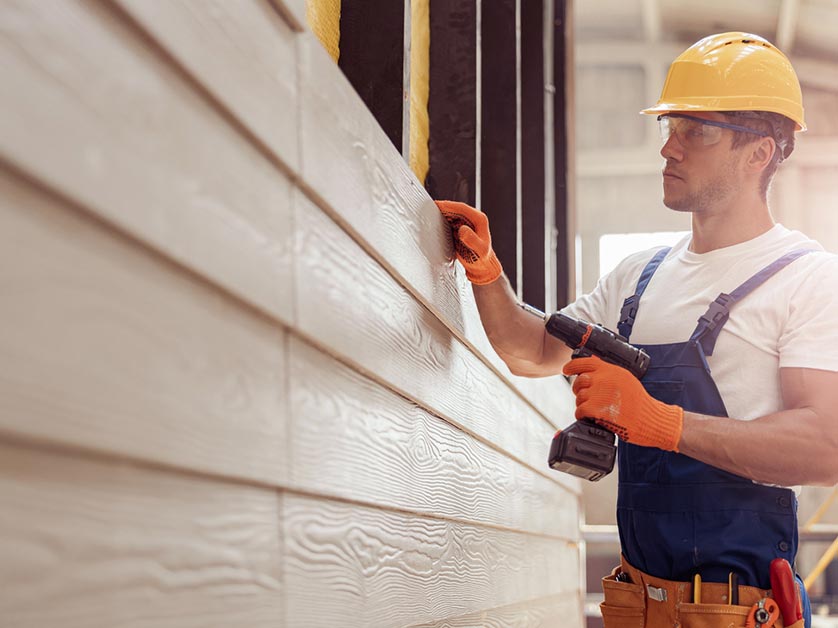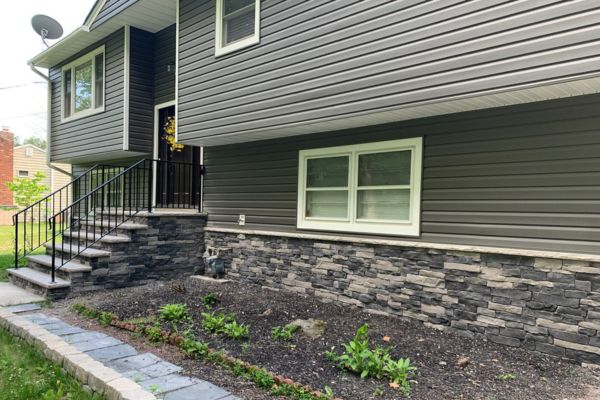Morris Siding Contractor with Years of Expertise in Home Exterior Upgrades
Morris Siding Contractor with Years of Expertise in Home Exterior Upgrades
Blog Article
The Important Guide to the Numerous Kinds of Exterior Siding and Their Unique Benefits
In the world of home enhancement, selecting the appropriate exterior siding is a critical decision that impacts both visual allure and practical performance. With so lots of options to consider, which exterior siding material really stands out for your details task?
Wood Home Siding
Wood house siding, a popular selection for domestic outsides, uses a timeless aesthetic that incorporates all-natural charm with structural honesty. This exterior siding material is available in different styles, consisting of clapboard, tiles, and board-and-batten, allowing home owners to tailor their façade to match their style preferences. Wood exterior siding is normally crafted from long lasting varieties such as cedar, redwood, or pine, which are known for their durability and ability to hold up against environmental stress factors.
One of the key benefits of timber home siding is its excellent insulation residential or commercial properties, which can add to energy performance and lower home heating costs. Furthermore, timber exterior siding is eco-friendly, making it an eco-friendly option when sourced sustainably. Routine maintenance, including paint or staining, can extend its life-span and enhance its appearance, permitting homeowners to protect the all-natural charm of the timber.
Nonetheless, potential disadvantages consist of susceptibility to bugs, rot, and climate damage, requiring ample treatment and maintenance - morris siding contractor. In spite of these problems, when properly taken care of, timber house siding can offer a lovely and durable remedy that boosts the character of a home while providing a warm, inviting atmosphere

Vinyl Exterior Siding
Plastic home siding has arised as a leading choice for home owners looking for a low-maintenance outside choice that combines durability and cost. This versatile product is crafted from polyvinyl chloride (PVC), making it resistant to different climate condition, consisting of wetness and UV rays. As an outcome, vinyl house siding does not warp, rot, or fade, making sure lasting visual appeal.
One of the key benefits of vinyl house siding is its comprehensive array of colors and styles, enabling house owners to achieve the preferred try to find their residential or commercial property without the requirement for constant repainting. Additionally, vinyl house siding is easy to set up, which can dramatically reduce labor expenses throughout building and construction or renovation projects.
Vinyl home siding additionally adds to energy efficiency. Numerous choices attribute insulation support, which enhances thermal performance, helping to maintain comfortable indoor temperatures and potentially reducing power expenses. In addition, its smooth surface area facilitates easy cleaning, requiring only periodic washing with a yard hose to remove dirt and particles.
Fiber Cement Siding
Fiber cement house siding has actually obtained grip amongst house owners and home builders alike because of its amazing combination of durability and visual adaptability. Made up of a combination of cellulose, cement, click over here and sand fibers, this house siding alternative is engineered to endure extreme climate condition, including high winds, hefty rain, and temperature fluctuations, making it a durable option for domestic outsides.

Among the primary advantages of fiber cement home siding is its resistance to pests, such as termites, and its non-combustible nature, offering boosted fire safety and security. morris siding contractor. Furthermore, it is offered in a vast selection of textures, styles, and shades, allowing house owners to achieve their preferred visual without giving up performance
One more like this benefit is its reduced maintenance demands; fiber concrete house siding usually calls for painting or staining every 5-10 years, which is less regular than various other products. Furthermore, its durability adds to a reduced total cost of ownership, as it minimizes the demand for constant repairs or replacements.
Inevitably, fiber concrete house siding stands for an excellent investment for those seeking a resilient, attractive, and flexible exterior choice, integrating both type and function to improve the home's visual charm.
Metal Home Siding
The appeal of metal house siding depends on its robust resilience and modern aesthetic allure, making it a popular selection for modern style. Offered in products such as light weight aluminum and steel, steel siding offers a variety of finishes and shades, enabling property owners to achieve a personalized appearance that enhances their style vision.

Energy efficiency is one more considerable advantage, as numerous metal home siding items are created with insulation choices that assist control indoor temperatures. This can result in decreased energy costs in time. Additionally, metal siding is frequently recyclable, making it an environmentally friendly choice for sustainability-minded homeowners.
The installment procedure for metal exterior siding can be relatively straightforward, resulting in a quicker turn-around time for building jobs. In general, metal house siding incorporates performance and style, making it a practical option for those looking for a aesthetically attractive and enduring outside surface.
Brick and Rock Exterior Siding
Brick and rock exterior siding stands out as a classic option that enhances the visual appeal of any home. Recognized for their toughness and low upkeep, these materials provide a remarkable roi while raising the residential property's visual allure. Offered in various colors, textures, and patterns, brick and rock can be tailored to match diverse building styles, from standard to modern.
One of the main advantages of block and stone exterior siding is their power effectiveness. Both materials possess natural protecting residential properties that aid regulate indoor temperature levels, possibly reducing cooling and heating prices. Furthermore, they use premium fire resistance compared to other home siding alternatives, adding to boosted safety.
Another benefit is their durability. Block and rock can last for years, usually requiring minimal upkeep beyond occasional cleaning. Unlike wood exterior siding, they are unsusceptible bugs and look at this website rot, making sure a durable outside that holds up against the components.
Verdict
In recap, the selection of house siding substantially affects a home's visual appeal, power effectiveness, and maintenance needs. Each type of house siding-- whether wood, vinyl, fiber brick, concrete, or metal and rock-- provides one-of-a-kind advantages tailored to numerous homeowner preferences and ecological problems.
One of the primary advantages of timber exterior siding is its excellent insulation properties, which can contribute to power efficiency and lower home heating costs. Furthermore, timber exterior siding is naturally degradable, making it an environmentally friendly choice when sourced sustainably.One of the key benefits of metal house siding is its resistance to various environmental aspects.Power efficiency is one more considerable benefit, as many metal home siding items are made with insulation options that assist control interior temperature levels. Each kind of siding-- whether wood, vinyl, fiber brick, cement, or metal and stone-- supplies unique benefits tailored to various property owner preferences and environmental conditions.
Report this page